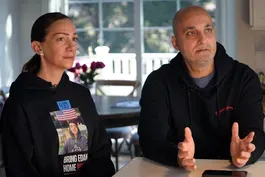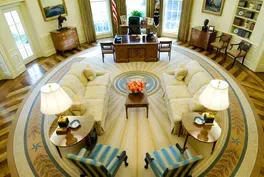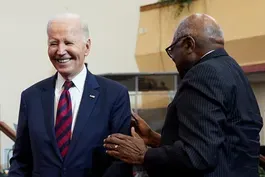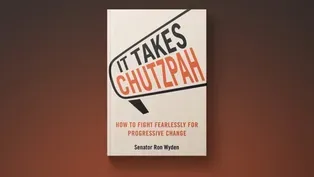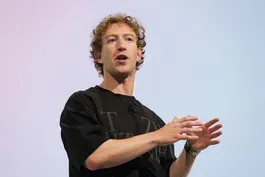
January 19, 2025 - PBS News Weekend full episode
1/19/2025 | 26m 44sVideo has Closed Captions
January 19, 2025 - PBS News Weekend full episode
Sunday on PBS News Weekend, the first hostages return to Israel and aid trucks enter Gaza as the ceasefire between Israel and Hamas goes into effect. Then, some of the world’s biggest companies make record-breaking donations to Trump’s inauguration. Plus, a look at a little-known White House tradition of outgoing presidents leaving personal notes for their successors.
Major corporate funding for the PBS News Hour is provided by BDO, BNSF, Consumer Cellular, American Cruise Lines, and Raymond James. Funding for the PBS NewsHour Weekend is provided by...

January 19, 2025 - PBS News Weekend full episode
1/19/2025 | 26m 44sVideo has Closed Captions
Sunday on PBS News Weekend, the first hostages return to Israel and aid trucks enter Gaza as the ceasefire between Israel and Hamas goes into effect. Then, some of the world’s biggest companies make record-breaking donations to Trump’s inauguration. Plus, a look at a little-known White House tradition of outgoing presidents leaving personal notes for their successors.
How to Watch PBS News Hour
PBS News Hour is available to stream on pbs.org and the free PBS App, available on iPhone, Apple TV, Android TV, Android smartphones, Amazon Fire TV, Amazon Fire Tablet, Roku, Samsung Smart TV, and Vizio.
Providing Support for PBS.org
Learn Moreabout PBS online sponsorshipJOHN YANG: Tonight on PBS News Weekend, the first hostages return to Israel and aid trucks enter Gaza as the ceasefire between Israel and Hamas goes into effect, pausing 15 brutal months of war.
And some of the world's biggest companies make record breaking donations to the Trump inauguration.
And top tech CEOs will be front and center at festivities.
And the little known and heartwarming White House tradition, outgoing presidents leaving personal notes for their successors.
WOMAN: This process, while sometimes a humorous one, sometimes a small one, is an important step in recognizing it's not about the people in the office, it's about the office itself.
(BREAK) JOHN YANG: Good evening.
I'm John Yang.
Tonight, three women are back on Israeli soil for the first time in 15 months since they were kidnapped in the October 7 Hamas attacks and held captive in Gaza.
Their return follows the implementation of the long awaited ceasefire between Hamas and Israel, pausing a war that's left Gaza devastated.
Hamas turned the women over to the Red Cross in Gaza, which transferred them to the Israeli military.
They were reunited with families and taken to a hospital.
The freed hostages are Romi Gonen, Emily Damari and Doron Steinbrecher.
Their safe return sparked celebrations across the country as jubilant Israelis danced and waved flags.
There was jubilation too in Gaza at the ceasefire and Israel's promised release of Palestinian prisoners.
Trucks laden with badly needed aid were seen in southern Israel headed to crossing points into Gaza.
In the United States, President Biden hailed it as a step forward.
JOE BIDEN, U.S. PRESIDENT: Today alone, we anticipate several hundred trucks will enter the Gaza Strip as I'm probably as I'm speaking, and after so much pain, destruction, loss of life, today the guns in Gaza have gone silent.
JOHN YANG: Hamas captured seven U.S. citizens on October 7.
Only three are thought to be still living.
Saki Decalhen and Keith Siegel, both are on the Hamas list of those to be released in the first phase.
And Edan Alexander, who is not on that list.
Earlier I spoke with Alexander's father, Adi, and asked him how he felt about today.
ADI ALEXANDER, Father Edan Alexander: It was a great start to begin with.
Today, it was a great day.
We are hopeful that Edan will be out between now and 42 days from now, although the road is still ahead of us and a lot of work to be done.
JOHN YANG: As you say, it's a long road ahead.
There may be some bumps on that road.
Are you concerned that there may be some bumps before Idan is released?
ADI ALEXANDER: I'm sure it will be a bumpy road, but I have no doubt about the execution of the whole phases of that deal.
I think it's been too long for this war to continue, and the commitment of the outgoing administration and incoming administration is ironclad strong.
So we are hopeful that all the phases will be implemented.
JOHN YANG: Do you think the impending return of Donald Trump to the White House may have helped get this thing over the finish line?
ADI ALEXANDER: Absolutely.
The Trump effect was crucial.
Using the deadline of January 20th as a deadline for the talks and for the release of the hostages was absolutely crucial as well.
And the firm language from the president elect helped as well.
So we are grateful.
JOHN YANG: I know Edan was able to call your wife as the attacks were beginning on October 7th.
They were able to speak.
Have you thought about when your wife and Idan's brother and sister are able to speak with him again that might be like, what you might want to say?
ADI ALEXANDER: So many questions to ask, you know, about that particular day on October 7 when he was surrounded and attacked.
The way he managed to surrender himself.
So many questions to ask.
And for the month that came after that, I'm eager to hear that and just to hug my son and to see what it has to say.
Hopefully we'll say, you know what, guys, it wasn't so bad after all.
I'm okay.
JOHN YANG: Have you thought about what those first few days will be like, having Edan back, being able to hug him again, as you say?
ADI ALEXANDER: I can't imagine.
I see the process that those three young women went through this morning in Israel.
I hope for the same to myself and to my family and just we'll keep praying.
JOHN YANG: You say you can't imagine what that's going to be like.
I can't imagine what the last 15 months has been like for you and your family.
How have you been able to keep going?
What has sustained you over the last 15 months?
ADI ALEXANDER: You just have to go into autopilot every day.
It's the same day.
Some interviews, talks, meetings just to push forward, you know, and keep this issue front and center for everybody and make sure that people actually do their jobs on all sides in Israel, in Qatar, Egypt, and the U.S. government, that everybody does his job to get those people out.
JOHN YANG: Do you think there's been some criticism or there was criticism of the prime minister for not getting this deal sooner or not pressing for a deal sooner?
Do you think this could have happened sooner if Mr. Netanyahu had pushed more?
ADI ALEXANDER: I mean, we've been very close before.
The deal is the same deal that was presented by President Biden and it was approved by the United Nations Security Council.
And we finally get to see the fruits of that deal after the intense diplomacy.
And I'm happy that diplomacy worked this time.
JOHN YANG: Adi Alexander, whose son Edan is being held in Gaza, thank you very much for your time, and I hope you and your family and Edan are all together soon.
ADI ALEXANDER: Thank you, John.
JOHN YANG: In today's other news, President Biden and President-elect Trump spent the final full day of their current roles by thanking supporters, but in very different ways.
Before his second tour of duty as Commander in Chief, Mr. Trump visited Arlington National Cemetery and laid a wreath at the Tomb of the Unknown Soldier.
This evening at a downtown Washington, D.C. Sports arena, Mr. Trump is to hold what's being billed as a MAGA victory rally.
For the final full day of his presidency, Mr. Biden visited with supporters in Charleston, South Carolina, the state that revitalized his faltering campaign in 2020.
He attended a church service and visited Charleston's International African American Museum.
TikTok has restored service to the 170 million users of the social media app less than 24 hours after it went dark because of a federal ban.
TikTok powered back on.
That was after President elect Trump said that once in office, he would try to give the China based parent company more time to find a government approved buyer.
The law that banned the act gives the president authority to grant a 90-day extension.
Millions of people across the country are bracing for dangerously cold conditions as a polar vortex moves south from the Arctic.
This latest round of winter weather is expected to bring bitterly cold temperatures, plunging the Northern Plains into single digits.
It's also set to bring a rare bout of freezing rain to the south.
President Biden pardoned the historic leader of the Black Nationalist Movement 85 years after his death.
Marcus Garvey was among five people to receive pardons from Mr. Biden on the eve of his leaving office.
Garvey, who died in 1940, mobilized the Black Nationalist Movement in the early 20th century.
He influenced the next generation of civil rights leaders, including Dr. Martin Luther King Jr. and Malcolm X.
Still to come on PBS News Weekend, how some of the world's biggest companies are making record breaking donations to President-elect Trump's inaugural committee and the modern history of the personal notes outgoing presidents leave their successors.
(BREAK) JOHN YANG: President-elect Trump's inaugural committee has smashed fundraising records, racking up more than $200 million in pledges.
Donations have come from leaders of big tech, financial services and telecommunications.
Some of those companies have big federal contracts or are regulated by the federal government.
Ali Rogan spoke with Craig Holman, an expert on ethics and campaign finance rules for Public Citizen, and Cecilia Kang, who covers technology for the New York Times.
ALI ROGIN: Thank you both so much for being here.
Craig, you've put together a research document on the Trump-Vance inaugural Committee fundraising.
How much have they raised and who's donating?
CRAIG HOLMAN, Government Affairs Lobbyist, Public Citizen: It's shattering all records this time around.
You know, the Trump Inaugural committee originally targeted $150 million to spend on the inauguration, which by itself would break records.
Then it upped it to 200 million because money just started flowing in.
And today we know it's going to be around 250 million.
And it shatters not only all records in terms of spending, but also in terms of donations.
The donations that we're aware of at this point are all $1 million to $5 million from the same donors who used to give to previous inaugurations, Trump's first one.
But back then it was in amounts of maybe 50,000 or 100,000.
ALI ROGIN: You mentioned that it's some of the same folks.
So who tends to be high on the list?
CRAIG HOLMAN: Well, at top of this list is the cryptocurrency industry.
So we've got ripple, that's given 5 million, you got Coinbase, it's given 1 million.
You've got Kraken, that's given 1 million.
And you know, they never gave those kinds of money before.
As a matter of fact, the cryptocurrency industry rarely even invested in politics until 2020.
ALI ROGIN: Cecilia, which tech moguls are we expecting to see at the inauguration tomorrow?
And what do we know about what they might be looking to get out of this new relationship?
CECILIA KANG, The New York Times: Just about every major tech CEO will be at the inauguration, many of whom will also be sitting on the dais with President-elect Donald Trump.
We know on the day, it's actually very interesting.
The three richest people in the world, Elon Musk, the founder of Tesla and the owner of X, Jeff Bezos, the founder of Amazon, and Mark Zuckerberg, co-founder of Meta, formerly known as Facebook, they'll all be sitting on the dais.
We also have the CEOs of Google, Apple, OpenAI, a very big and hot AI company, as well as the CEO of TikTok, who will be sitting there.
So the question is really more so who won't be there from the tech industry?
The Silicon Valley is really taking over Washington this weekend.
ALI ROGIN: And of course, the use of money and presence to influence policy is a time honored tradition in Washington.
But this does seem to be at a new level and at the same time we've seen a number of changes that these companies have made.
Meta just replaced its fact checking program.
They're instead going to rely on users to monitor content.
President Trump is launching a cryptocurrency.
What are the tech stories that you're looking at that are going to be big as we enter this administration?
And how might these players be trying to parliament lay these donations into influence in these early days?
CECILIA KANG: So I'm really interested in AI policy, what's going to happen in the world of artificial intelligence and how the incoming administration is expected to really support and promote American AI companies.
That's one reason why a lot of these tech CEOs are very enthusiastic about Trump coming into office.
The other thing I'm looking into is how President-elect Trump deals with speech policies and whether he will take away legal protections for social media companies whom he has criticized in the past.
This is one of another reason why CEOs like Mark Zuckerberg are very interested and concerned about Trump coming into the office because they're afraid that there will be some sort of retribution or punishment of their companies and their social media sites that conservatives and Republican lawmakers as well as Trump have criticized for allegedly censoring their content.
ALI ROGIN: Craig, after the inauguration and all the related festivities are over, what happens to the money that's left over and what does the law say about it?
CRAIG HOLMAN: There is no restriction on how the surplus money gets spent and there is no disclosure.
If Trump doesn't want to tell us how he spent the surplus money, we aren't going to know what happened to it.
When it comes to the inaugural funding, there are so few rules in place.
One, only two.
One, foreign nationals can't make a donation.
And the second is we find out after sometime in the spring, the donors of $200 or more.
We don't know how the money gets spent.
We don't know what happens to the surplus funds.
And quite frankly we there is no restriction on how Trump dispenses the surplus funds.
ALI ROGIN: And I know that there's been long standing efforts to change this.
What's the status of those efforts?
CRAIG HOLMAN: There have been.
And the bills to try to require disclosure of expenditures, to ban corporate contributions and government contractors has never gone very far.
But this time around, we're seeing the abuses of this inauguration of such a level that I'm suspecting the same legislation that we couldn't move before might get legs this time.
ALI ROGIN: Craig Holman with Public Citizen, Cecilia Kang with the New York Times, thank you both so much for joining us.
CRAIG HOLMAN: Thank you.
CECILIA KANG: Thank you.
JOHN YANG: As Donald Trump returns to the White House, and with Republicans in charge of both the House and the Senate, Democrats are searching for a way forward.
Ron Wyden, the second most senior Senate Democrat and a leading progressive voice, offers something of a strategy guide in his new book, "It Takes Chutzpah: How to Fight Fearlessly for Progressive Change."
Amna Nawaz recently sat down with Wyden.
AMNA NAWAZ: Thanks for being here.
SEN. RON WYDEN, Senate Democrat: Good to be with you.
AMNA NAWAZ: So you write in this book a lot about your own family story as well, of the child of Jewish refugees who escaped Nazi Germany in the 1930s, how this all inspired the way that you live and work, this idea of chutzpah being central to how you do your work for the uninformed among us.
How do you define it?
RON WYDEN: It is inherently good, and it is the indispensable instrument to have a better life in America.
It's about grit, it's about nerve, it's about taking on big odds.
For example, I was just a kid who had sort of had my start working with senior citizens after I was dreaming of playing in the NBA.
And that didn't work out.
And the senior citizen said, why don't you run for Congress?
And I was 29 years old.
I'd never run for student body eraser cleaner.
I had never done anything political.
But one of them said to me, looked at me and talked about chutzpah.
She said, nobody can say no to their grandmother.
And I got elected to Congress.
AMNA NAWAZ: You do lay out how this value is really driven you over your four decades in Congress.
When you look where your party is right now, though, having just lost an election, essentially leaderless, where do you see that chutzpah?
RON WYDEN: Well, we've got to focus on what's really important to people.
I'm going home here in a day or so, and I have town hall meetings, something else nobody's ever done.
People thought that took a lot of chutzpah.
But at 1100 town meetings, we just throw open the doors.
We let people give their opinion.
And I can tell you the concerns are ones where the second word is always bill.
It's health care bill, it's housing bill, it's electric bill.
And the social issues are incredibly important.
I was the first senator to support marriage equality.
I did it with one sentence.
I said, if you don't like gay marriage, don't get one.
That took a lot of chutzpah.
So we got to focus on the economics that people are talking about in their kitchens and living rooms.
AMNA NAWAZ: You're saying Democrats didn't do enough of that in the past.
They should do more of it moving forward.
RON WYDEN: The message was hard to follow.
For example, when we talked about food prices and getting clobbered over the head when you walked into a grocery, we really didn't talk about the big issue that I fought for, which was the Albertsons and Kroger's merger.
If that had gone through and I led the opposition to it would have been the biggest food merger in American history.
Ask yourself, did you see a lot of it in the presidential campaign?
Nope.
AMNA NAWAZ: What would you say is sort of the defining strategy for Democrats looking ahead to these next four years?
RON WYDEN: Well, I'll give you distilling out the Trump economic plan.
The Trump economic plan is all about helping people at the top and cutting Medicaid and hunger programs to pay for it.
And our policy is giving everybody in America the chance to get ahead.
The Republicans are talking about helping the people at the top, and then they basically, they won't say it this way.
Hope everything trickles down to somebody who might be a checker in a grocery store.
AMNA NAWAZ: You also write a lot about how this inspired you to reach across the aisle to pursue bipartisan work that other people weren't.
You wrote in a government allegedly paralyzed bipartisan gridlock, I routinely team up with deeply conservative Republicans to pass legislation.
We're speaking now at a time when even someone like Mike Turner, right, a congressman who's known for having a bipartisan working reputation, lost his spot on the Intelligence Committee, reportedly because President Trump doesn't want him there.
Do you think Republicans are incentivized to work with you across the aisle if the president doesn't want them to?
RON WYDEN: Well, we'll see.
You know, they're always worried about primaries.
You know, they're worried that they'll have a primary if they oppose Trump.
And you know what?
I did, and you see it in one of the chapters, the one that focuses on my work with the internet, the 26 words that created the Internet.
I found one of the sharpest Republicans, Chris Cox.
We were both young.
We wanted to come up with the ground rules for the Internet.
I came, believe it or not, to the Senate when only one person knew how to use a computer.
And I wrote the law, for example, on the digital signatures issue, which is how I signed the book.
AMNA NAWAZ: Do you see common ground, though, that you can work with Republicans on moving forward?
RON WYDEN: I do.
And my crapo.
He and I wrote the bill to rein in these pharmacy benefit managers.
They're called PBMs.
They used to make sense 30 years ago when we didn't have a lot of data and people didn't have technology.
Now these PBMs are too often ripping off taxpayers and seniors.
Mike Crapo and I talk about how were going to have another bipartisan effort.
We almost got it passed last Congress.
AMNA NAWAZ: Oregon senior Senator Ron Wyden, author of the book "It Takes Chutzpah: How to Fight Fearlessly for Progressive Change" Thank you so much for being here.
RON WYDEN: Tell everybody, use your chutzpah.
JOHN YANG: Tomorrow's change of Oval Office occupants is a ritual full of traditions and customs.
One of the more modern ones began in 1989 when Ronald Reagan left a note for George H.W.
Bush on stationary with a whimsical bit of advice.
Since then, the messages have often been heartfelt and written on more staid White House stationery, like the one Bush himself left for Bill Clinton, wishing him great happiness.
Lindsay Chervinsky is the executive director of the George Washington Presidential Library.
Lindsey, since Reagan left that note in 1989, by my count, there have been five of those notes.
Has there been a common theme?
LINDSAY CHERVINSKY, GEORGE WASHINGTON PRESIDENTIAL LIBRARY: Well, I think theme in general is about patriotism, service, the importance of the office being bigger than one person and sort of an inspirational encouragement for the next person in office.
JOHN YANG: How are they usually left?
Are they handed to them or how does it work?
LINDSAY CHERVINSKY: They're usually left on the desk.
It's usually one of the last things a president does.
They'll usually write their successor's name and then leave it on the desk for them to find when they come into the office for the first time.
JOHN YANG: They come in the office for the first time after the inaugural ceremony, after they come down Pennsylvania Avenue?
LINDSAY CHERVINSKY: Absolutely.
JOHN YANG: One of the longer ones was Barack Obama's for Donald Trump.
It was Donald Trump said he found it so thoughtful that he even called Obama to thank him for it.
What did it say?
LINDSAY CHERVINSKY: Yeah, this letter is interesting because it's a little bit more preachy than some of the other letters.
It kind of reminds Trump of The challenges that some Americans face, that they are not all as fortunate as Obama and Trump.
It reminds him about the importance of democratic norms and institutions, and the office being a symbol of that, not just being about Trump's political fortunes.
And it reminds him to enjoy his family while he's in office, because the job is a hard one.
JOHN YANG: Sometimes these letters are not made public for a while.
Should they remain private?
Should the private messages and communications between the two men?
Or is it important for American public to see this as part of the peaceful transition of power?
LINDSAY CHERVINSKY: I think it's appropriate for a president to keep them private for a little while, maybe while they're in office.
But I do think it is important for the American people to ultimately see them, because it does remind the Americans that the peaceful transfer of power is the bedrock of what it means to have a republic.
And this process, while sometimes a humorous one, sometimes a small one, is an important step in recognizing it's not about the people in the office, it's about the office itself.
JOHN YANG: Before Reagan started this tradition, were there similar things, similar messages and communications between presidents and their successors in history?
LINDSAY CHERVINSKY: Well, sometimes they would exchange letters, often after the inauguration.
I think the most important one perhaps occurred early in 1801, when John Adams had left Washington, D.C. went back to Massachusetts.
That election had been nearly catastrophic.
The threat of violence was real and palpable, and it was a real constitutional crisis.
And he got back home and he said to Jefferson, everything is peaceful here.
I wish you a safe and happy administration.
And that really set the tone for what we want presidents to do.
JOHN YANG: The notes that have been left since Ronald Reagan, are there any others that sort of stand out?
LINDSAY CHERVINSKY: Well, I think Reagan's is really fun because, you know, they had been in the administration together.
And as you said, the stationary is quite silly.
It's an elephant with little turkeys on it.
And it said, don't let the turkeys get you down.
And you might sometimes want to use this stationary.
And I think that humor is important because the job is so hard and the decisions are so difficult that if you don't have a sense of humor, I think it can crush you.
JOHN YANG: You know, you talk about the peaceful transfer of power in 2020.
There was almost a breakdown of that, a bitter argument over whether the election was stolen.
But still, Mr. Trump left a letter for Mr. Biden.
LINDSAY CHERVINSKY: He did, and we don't yet know what it said.
You know, Biden said that it was private and he was going to thank Trump personally for it.
I'm sure at some point we'll see it once the president's letters are made public.
But I find it encouraging that even when we had the most contested transition we've ever had, that letter still was there.
JOHN YANG: Lindsay Chervinsky, thank you very much.
LINDSAY CHERVINSKY: Thank you.
JOHN YANG: And that is PBS News Weekend for this Sunday.
On Monday, join us for special coverage of President Trump's inauguration beginning at 10:30 a.m. Eastern, 9:30 Central.
I'm John Yang.
For all of my colleagues, thanks for joining us.
Have a good week.
Father of U.S. hostage hopeful for son’s release by Hamas
Video has Closed Captions
Father of U.S.-Israeli hostage hopeful for son’s release as Gaza ceasefire gets underway (5m 29s)
The history and tradition of presidential transition letters
Video has Closed Captions
The history and tradition of presidents leaving personal notes for their successors (4m 20s)
News Wrap: Biden thanks supporters on last day of his term
Video has Closed Captions
News Wrap: Biden thanks supporters in South Carolina on last full day of his term (2m 18s)
Sen. Wyden offers way forward for progressives in new book
Video has Closed Captions
Sen. Wyden offers way forward for progressives in new book ‘It Takes Chutzpah’ (5m 30s)
Tech and AI leaders make big donations to Trump inauguration
Video has Closed Captions
Leaders in tech, AI and cryptocurrency make big donations to Trump inauguration (5m 42s)
Providing Support for PBS.org
Learn Moreabout PBS online sponsorshipMajor corporate funding for the PBS News Hour is provided by BDO, BNSF, Consumer Cellular, American Cruise Lines, and Raymond James. Funding for the PBS NewsHour Weekend is provided by...

